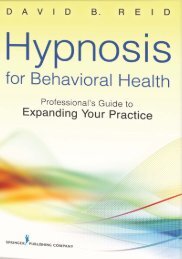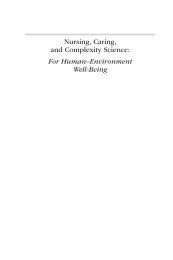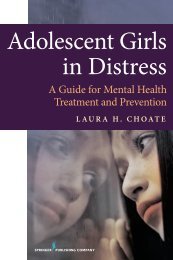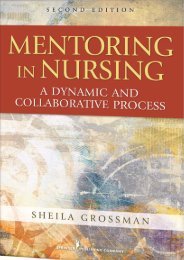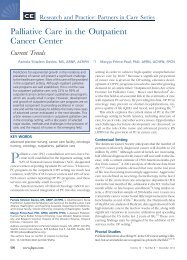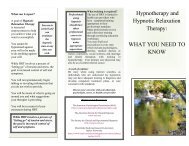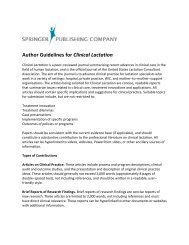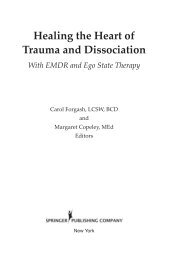Expertise in nursing practice : caring, clinical judgment - Springer ...
Expertise in nursing practice : caring, clinical judgment - Springer ...
Expertise in nursing practice : caring, clinical judgment - Springer ...
You also want an ePaper? Increase the reach of your titles
YUMPU automatically turns print PDFs into web optimized ePapers that Google loves.
20 <strong>Expertise</strong> <strong>in</strong> Nurs<strong>in</strong>g Practice<br />
understood, preserved, and enhanced by nurs<strong>in</strong>g as a car<strong>in</strong>g profession.<br />
As Benner and Wrubel (1989) put it, “Nurses promote heal<strong>in</strong>g through<br />
assist<strong>in</strong>g the patient <strong>in</strong> ma<strong>in</strong>ta<strong>in</strong><strong>in</strong>g the human ties and concerns. And it<br />
is this human connection that gives people the courage to weather their<br />
illness” (p. 87).<br />
S<strong>in</strong>ce the human way of be<strong>in</strong>g is <strong>in</strong>volved and holistic, there can<br />
be no abstract, analytical theory of it. Car<strong>in</strong>g is what one might call an<br />
existential skill. It is, <strong>in</strong>deed, what Socrates would have called aknack,<br />
but s<strong>in</strong>ce, unlike cook<strong>in</strong>g, it is a matter of life and death and <strong>in</strong>volvesthe<br />
whole person, that term hardly seems appropriate. Itshows the power of<br />
a tradition based on the theory of disease that the existential skills have<br />
no traditional name that doeshonorto their importance and uniqueness,<br />
and we seem to have no appropriate word for them <strong>in</strong>our vocabulary.<br />
The best we can come up with is that car<strong>in</strong>g, as a way of help<strong>in</strong>g people<br />
by enter<strong>in</strong>g their world, is a higher k<strong>in</strong>d of knowledge that we can call<br />
understand<strong>in</strong>g.<br />
Psychotherapy, which claims to have atheory of mental disease—<br />
that is, ascientific account of the m<strong>in</strong>d and of its normal and abnormal<br />
function<strong>in</strong>g—might seem to belie our claim that there can be no theory<br />
of tact. However, if theexistential th<strong>in</strong>kers arecorrect, and we th<strong>in</strong>k<br />
theyare, a psychology such as psychoanalytical theory (modeled onmedical<br />
theory) with its handbook of psychopathology (modeled on bodily<br />
pathology) isadream that can never be realized. It is<strong>in</strong>terest<strong>in</strong>g <strong>in</strong> this<br />
connection to note that as psychotherapists ga<strong>in</strong> experience <strong>in</strong> car<strong>in</strong>g<br />
for patients, despite their <strong>in</strong>tense theoretical disagreements, they come<br />
more and more to resemble each other <strong>in</strong>their <strong>practice</strong>. This suggests<br />
that psychotherapists make less and less useoftheory as they ga<strong>in</strong> expertise.<br />
Nurses,ontheother hand, <strong>in</strong>sofar as their work consists <strong>in</strong> apply<strong>in</strong>g<br />
medical theory, learn and apply more and more theory as they<strong>in</strong>crease <strong>in</strong><br />
experience and expertise. Their understand<strong>in</strong>g of where theory is appropriate<br />
should help nursesresist any temptationtoformulate the pr<strong>in</strong>ciples<br />
of their existential skills. Thecurrent theories of car<strong>in</strong>g <strong>in</strong> nurs<strong>in</strong>g are typically<br />
<strong>in</strong>terpretive perspectives on care, but this should not underm<strong>in</strong>e<br />
their legitimacy (Benner, 1994a; Morse, Bottorff, Neander, &Solberg,<br />
1991).<br />
This does not mean that there is noth<strong>in</strong>g to be said about the tact<br />
<strong>in</strong>volved<strong>in</strong>world preserv<strong>in</strong>g. We have already said a gooddeal. Onecan<br />
describe the general structureofhuman be<strong>in</strong>gs and the way careconsists<br />
of matter<strong>in</strong>g, possibilities, and <strong>in</strong>habit<strong>in</strong>g a shared world. This is what<br />
Heidegger (1962) calls an existential account of the human be<strong>in</strong>g. One<br />
can also describe <strong>in</strong> detail howspecificcultures,families, and <strong>in</strong>dividuals



